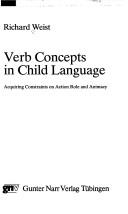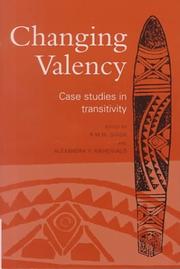| Listing 1 - 10 of 88 | << page >> |
Sort by
|
Book
ISBN: 0297816470 9780297816478 Year: 1999 Publisher: London Weidenfeld & Nicolson
Abstract | Keywords | Export | Availability | Bookmark
 Loading...
Loading...Choose an application
- Reference Manager
- EndNote
- RefWorks (Direct export to RefWorks)
Psycholinguistics --- Language and languages --- Grammar, Comparative and general --- Verb --- Grammar, Comparative and general - Verb

ISBN: 3878089937 9783878089933 Year: 1982 Volume: 12 Publisher: Tübingen Narr
Abstract | Keywords | Export | Availability | Bookmark
 Loading...
Loading...Choose an application
- Reference Manager
- EndNote
- RefWorks (Direct export to RefWorks)
Book
ISBN: 8489377294 9788489377295 Year: 2001 Volume: 1 Publisher: Lugo Tris Tram
Abstract | Keywords | Export | Availability | Bookmark
 Loading...
Loading...Choose an application
- Reference Manager
- EndNote
- RefWorks (Direct export to RefWorks)
Lexicology. Semantics --- Comparative linguistics --- Grammar --- Grammar, Comparative and general --- Verb --- Congresses --- Grammar, Comparative and general - Verb - Congresses

ISBN: 9780521135207 9780511627750 9780521660396 Year: 2000 Publisher: Cambridge Cambridge University Press
Abstract | Keywords | Export | Availability | Bookmark
 Loading...
Loading...Choose an application
- Reference Manager
- EndNote
- RefWorks (Direct export to RefWorks)
This book provides a general perspective on valency-changing mechanisms - passives, antipassives, causatives, applicatives - in the languages of the world. It contains a comprehensive typology of causatives by R. M. W. Dixon, and detailed descriptions of valency-changing mechanisms in ten individual languages by leading scholars, based on original fieldwork. The sample languages span five continents and every kind of structural profile. Each contributor draws out the theoretical status and implications of valency-changing derivations in their language of study, and the relevant parameters are drawn together, and typological possibilities delineated, in the editors' introduction. The volume, originally published in 2000, will interest typologists, those working in the fields of morphosyntactic variation and lexical semantics, and exponents of formal theories engaging with the range of linguistic diversity found in natural language
Book
ISBN: 847522637X 9788475226378 Year: 2001 Volume: 6 Publisher: Madrid Visor Libros
Abstract | Keywords | Export | Availability | Bookmark
 Loading...
Loading...Choose an application
- Reference Manager
- EndNote
- RefWorks (Direct export to RefWorks)
Spanish language --- Grammar --- Grammar, Comparative and general --- Verb --- Dialects --- Castilian --- Syntax. --- Verb. --- Grammar, Comparative and general - Verb --- Spanish language - Dialects - Castilian - Verb

ISBN: 9789027231017 902723101X Year: 2007 Volume: 91 Publisher: Amsterdam Benjamins
Abstract | Keywords | Export | Availability | Bookmark
 Loading...
Loading...Choose an application
- Reference Manager
- EndNote
- RefWorks (Direct export to RefWorks)
Lexicology. Semantics --- Motion in language --- Lexicology --- Grammar, Comparative and general --- Language and languages --- Verb. --- Linguistics --- English language --- Verb --- Verb phrase --- Verbals --- Reflexives --- Philology --- Grammar, Comparative and general - Verb
Book
ISBN: 9783110198652 3110198657 Year: 2007 Volume: 198 Publisher: Berlin Mouton de Gruyter
Abstract | Keywords | Export | Availability | Bookmark
 Loading...
Loading...Choose an application
- Reference Manager
- EndNote
- RefWorks (Direct export to RefWorks)
Grammar --- Grammar, Comparative and general --- Syntagme verbal --- Verb phrase. --- Verb phrase --- Academic collection --- Predicate (Grammar) --- Phrasal verb --- Predicate --- Verbals --- Linguistics --- Philology --- Grammar, Comparative and general - Verb phrase
Book
ISBN: 9783875488593 3875488598 Year: 2018 Volume: 25 Publisher: Hamburg Helmut Buske Verlag
Abstract | Keywords | Export | Availability | Bookmark
 Loading...
Loading...Choose an application
- Reference Manager
- EndNote
- RefWorks (Direct export to RefWorks)
From the contents: 00Frank Sode & Hubert Truckenbrodt: Verb position, verbal mood, and root phenomena in German00Nathalie Staratschek: Desintegrierte weil-Verbletzt-Sätze ? Assertion oder Sprecher-Commitment?00Rita Finkbeiner: Warum After Work Clubs in Berlin nicht funktionieren. Zur Lizensierung von w-Überschriften in deutschen Pressetexten00Imke Driemel: Variable verb positions in German exclamatives00Ulrike Demske: Syntax and discourse structure: verb-final main clauses in German00Janina Beutler: V1-declaratives and assertion00Julia Bacskai-Atkari: Clause typing in main clauses and V1 conditionals in Germanic 00Ines Rehbein, Hans G. Müller & Heike Wiese: The hidden life of V3: an overlooked word order variant on verb-second00Ciro Greco & Liliane Haegeman: Initial adverbial clauses and West Flemish V30Artemis Alexiadou & Terje Lohndal: V3 in Germanic: a comparison of urban vernaculars and heritage languages00Volker Struckmeier & Sebastian Kaiser: Just how compositional are sentence types?
Grammar, Comparative and general --- Verb --- Word order --- Deutsch. --- Germanische Sprachen. --- Syntax. --- Verb. --- Wortstellung. --- Word order. --- Grammar, Comparative and general - Verb --- Grammar, Comparative and general - Word order
Book
ISSN: 18614167 ISBN: 9781501516580 9781501508141 9781501508042 1501508040 1501508148 1501516582 Year: 2020 Volume: 34 Publisher: Boston, Mass. De Gruyter Mouton
Abstract | Keywords | Export | Availability | Bookmark
 Loading...
Loading...Choose an application
- Reference Manager
- EndNote
- RefWorks (Direct export to RefWorks)
This book addresses a general phenomenon in the European languages: verb second. The articles provide a comprehensive survey of synchronic vs. diachronic developments in the Germanic and Romance languages.New theoretical insights into the interaction of the properties of verbal mood and syntactic structure building lead to hypotheses about the mutual influence of these systems. The diachronic change in the syntax together with changes in the inflectional system show the interdependence between the syntactic and the inflectional component.The fact that the subjunctive can license verb second in dependent clauses reveals further dependencies between these subsystems of grammar. "Fronting finiteness" furthermore constitutes an instance of a main clause phenomenon. Whether "assertion" or "at-issueness" are encoded through this grammatical process will be a matter in the debates discussed in the book. Moreover, information structure appears to be directly related to the fronting of other constituents in front of the finite verb. Questions concerning the interrelations between these various subcomponents of the grammatical system are investigated.
Grammar --- German language --- E-books --- Grammar, Comparative and general --- Semantics --- Comparative grammar --- Verb phrase --- Grammar, Comparative and general - Verb phrase - Congresses --- Semantics - Congresses
Book
ISBN: 9783110726831 3110726831 3110726262 Year: 2021 Publisher: Berlin ; Boston : De Gruyter,
Abstract | Keywords | Export | Availability | Bookmark
 Loading...
Loading...Choose an application
- Reference Manager
- EndNote
- RefWorks (Direct export to RefWorks)
Die vorliegende Studie stellt die in der internationalen Forschungsliteratur zur Argumentweglassung weit verbreitete Annahme, dass objektlosen Varianten der Verben, die Argumentweglassung erlauben, häufig mit semantischen Spezialisierungen - (In-)Definitheit, sortale Spezifikation, implizite Reflexivität und Polarisierung - verbunden sind, in Frage.In Korpusrecherchen und Fragebogenuntersuchungen geht es vor allem darum zu ermitteln, ob es vor dem Hintergrund einer Polysemie-Hypothese nicht unter Umständen angebrachter wäre, die Weglassungsoption einer von mehreren Verblesarten zuzuordnen, der sie - zumindest was die sortale Einengung des Objekts betrifft - dann keine Interpretationsbesonderheiten im Vergleich mit der Vollvariante hinzufügt. Vielmehr übernimmt sie die sortalen Besonderheiten der jeweiligen Verblesart; die Weglassung wäre somit sortal‐semantisch neutral.Umfangreiche Einzelverbuntersuchungen werden zeigen, dass einzig die Festlegung auf kontextuell gegebene Argumente bei definiter Weglassung als Effekt von lexikalisch bedingter Weglassung analysiert werden kann. Alle anderen beobachtbaren semantischen Besonderheiten impliziter Argumente ergeben sich aus den reichhaltigen Polysemiestrukturen der untersuchten Verben. Transitive verbs can often leave their arguments implicit. Until now, the objectless variants of these verbs have been frequently associated with specific meanings. This volume demonstrates that most verbs have different interpretations with different valency frames and specific conditions for omission. Accordingly, statements about omission and their semantic consequences must be applied to the interpretations of a verb.
| Listing 1 - 10 of 88 | << page >> |
Sort by
|

 Search
Search Feedback
Feedback About UniCat
About UniCat  Help
Help News
News